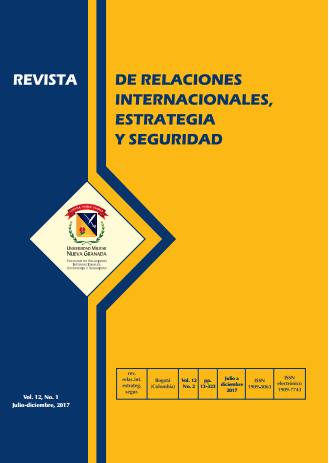La agenda de los estudios de seguridad post 9/11: ¿de qué y quiénes hablan?
Resumen
El 9/11 de 2001 generó un gran impacto no solo en la política y las economías internacionales, sino además en el mundo académico, que fue demandado por explicaciones que permitieran comprender lo que ocurría y que guiaran la toma de decisiones.
Intelectuales adscritos a diferentes corrientes de pensamiento comenzaron a ensayar diversas opciones en un proceso que avanzó en su objetivo inmediato, pero que también reveló tensiones epistemológicas larvadas, con lo cual se pudo asistir a un debate intenso, complejo y erudito.
El debate intelectual post 9/11 quedó cautivo por la tesis de Samuel Huntington sobre choque de civilizaciones, donde la dimensión civilizacional y cultural se transformó en el factor crítico. En esta discusión, si bien la religión estuvo presente, no alcanzó la centralidad que en efecto tuvo en el fenómeno vislumbrado con el 9/11. Esta paradoja llevó a que se gastara mucha energía en buscar las claves explicativas donde solo había fragmentos de ella.
Por lo anterior, este estudio pretende ofrecer un balance crítico de la discusión sobre seguridad después del 9/11, haciendo un examen de autores, preguntas e hipótesis en circulación, a fin de contar con el mapa del debate verificado desde entonces.
Descargas
Disciplinas:
Relaciones Internacionales, Seguridad y DefensaLenguajes:
esReferencias bibliográficas
Acharya, A. y Buzan, B. (2010). Non-Western International Relations Theory: Perspectives On and Beyond Asia. Nueva York: Routledge.
Al-Rodhan, N. (2007). The Five Dimensions of Global Security Proposal for a Multi-sum Security Principle. Suiza: LIT.
Andreas, P. (mayo, 2003). A Tale of Two Borders: the US-Mexico and US-Canada Lines After 9/11. Working Paper (77). The Center for Comparative Immigration Studies.
Blakeley, R. (2009). State Terrorism and Neoliberalism: The North in the South. Nueva York: Routledge.
Booth, K. y Dunne, T. (2011). Terror in Our Time. Nueva York: Routledge.
Bourdieu, P. (1993). The Field of Cultural Production. Nueva York: Columbia University Press.
Bullis, D. R. y Irving, R. D. (2013). Journals Supporting Terrorism Research: Identification and Investigation into Their Impact on the Social Sciences. College & Research Libraries, 74 (2), 119-130. https://doi.org/10.5860/crl-314
Burgess, J. P. (2012). Handbook of New Security Studies. Nueva York: Routledge.
Buzan, B. (1983). People, States & Fear: The National Security Problem in International Relations. Sussex: Wheatsheaf Books.
Buzan, B. y Buzan, T. (1996). The Mind Map Book: How to Use Radiant Thinking to Maximize Your Brain's Untapped Potential. Nueva York: Plume.
Buzan, B. y Hansen, L. (2009). The evolution of international security studies. Cambridge: Cambridge University Press. https://doi.org/10.1017/CBO9780511817762
Buzan, B. y Herring, E. (1998). The Arms Dynamic in World Politics. Boulder: Lynne Rienner Publishers.
Buzan, B. y Wæver, O. (2004). Regions and Powers: The Structure of International Security. Cambridge: Cambridge University Press.
Buzan, B., Jones, C. y Little, R. (1993). The Logic of Anarchy: Neorealism to Structural Realism. Nueva York: Columbia University Press.
Buzan, B., Wæver, O. y De Wilde, J. (1998). Security: A New Framework for Analysis. Boulder: Lynne Rienner Publishers.
Chadwick, E. (2011). Self-determination in the Post-9/11 Era. Nueva York: Routledge.
Collins, A. (2009). Contemporary Security Studies. Oxford: Oxford University Press.
Cruickshank, P. (2012). Al Qaeda. Nueva York: Routledge.
Daase, C. (2007). Knowns and Unknowns of the War on terror, Uncertainty and the Political Construction of Danger. Security Dialogue, 38(4), 411-434. https://doi.org/10.1177/0967010607084994
Geltzer, J. A. (2009). US Counter-Terrorism Strategy and al-Qaeda: Signalling and the Terrorist World-View. Nueva York: Routledge.
Hansen, L. (2006). Security as Practice: Discourse Analysis and the Bosnian War. Nueva York: Routledge.
Haynes, J. (2012). Religious Transnational Actors and Soft Power. Nueva York: Routledge.
Heng, Y.-K. (2006). War as Risk Management: Strategy and Conflict in an Age of Globalised Risks. Londres: Routledge.
Heng, Y.-K. y McDonagh, K. (2009). Risk, Global Governance and Security: The Other War on Terro. Nueva York: Routledge.
Heng, Y.-K. y McDonagh, K. (2009). Risk, Global Governance and Security: the other war on terror. Londres: Routledge.
Hiro, D. (2013). Holy Wars (Routledge Revivals): The Rise of Islamic Fundamentalism. Nueva York: Routledge.
Hough, P. (1998). The Global Politics of Pesticides: Forging Consensus from Conflicting Interests. Londres: Earthscan Publications.
Hough, P. (2004). Understanding Global Security. Nueva York: Routledge.
Huntington, S. P. (1996). The Clash of Civilizations and the Remaking of World Order. Nueva York: Simon & Schuster.
Huntington, S. (1993). The Clash of Civilizations? Foreign Affairs, 72(3), 22-49. https://doi.org/10.2307/20045621
Inbar, E. y Frisch, H. (. (2008). Radical Islam and International Security: Challenges and Responses. Nueva York: Routledge.
Jackson, R. y Sinclair, S. J. (2012). Contemporary Debates on Terrorism. Abingdon: Routledge.
Jefferis, J. L. (2009). Religion and Political Violence: Sacred Protest in the Modern World. Nueva York: Routledge.
Kane, T. M. y Lonsdale, D. J. (2011). Understanding Contemporary Strategy. Nueva York: Routledge.
Kaplan, J. (2010). Terrorist Groups and the New Tribalism: Terrorism's Fifth Wave. Nueva York: Routledge.
Karp, R., Karp, A. y Terriff, T. (. (2007). Global Insurgency and the Future of Armed Conflict Debating Fourth-Generation Warfare. Nueva York: Routledge.
Kessler, O. y Daase, C. (2008). From Insecurity to Uncertainty: Risk and the Paradox of Security Politics. Alternatives: Global, Local, Political, 33(2), 211-232. https://doi.org/10.1177/030437540803300206
Kolodziej, E. A. (2005). Security and International Relations. Cambridge: Cambridge University Press . https://doi.org/10.1017/CBO9780511614903
Kolodziej, E. A. y Kanet, R. E. (2008). From Superpower to Besieged Global Power. Restoring World Order after the Failure of the Bush Doctrine. Athens: University of Georgia Press.
Kolodziej, E. (2011a). Security. En K. Dowding (Ed.), Encyclopedia of Power (pp. 590-595). California: SAGE Publications. https://doi.org/10.4135/9781412994088.n328
Kolodziej, E. (2011b). Global Governance. En K. Dowding (Ed.), Encyclopedia of Power (pp. 281-284). California: SAGE Publications.
Krause, K. y Williams, M. C. (1996). Broadening the Agenda of Security Studies: Politics and Methods. Mershon International Studies Review, 42(2), 229-254. https://doi.org/10.2307/222776
Kuhn, T. (1971). The Structure of Scientific Revolutions. Chicago y London: A Phoenix Book.
Lipschutz, R. D. (1995). On Security. Nueva York: Columbia University Press.
Mauer, V. y Dunn Cavelty, M. (2010). The Routledge Handbook of Security Studies. Nueva York: Routledge.
McDonnell, T. (2011). The United States, International Law and the Struggle against Terrorism. Nueva York: Routledge.
Miles, A. (2014). US Foreign Policy and the Rogue State Doctrine . Nueva York: Routledge.
Moghadam, A. y Fishman, B. (2013). Fault Lines in Global Jihad Organizational, Strategic, and Ideological Fissure. Nueva York: Routledge.
Morgenthau, H. J. (1948). Politics Among Nations: The Struggle for Power and Peace. Nueva York: Alfred A. Knopf.
Rosenfeld, J. E. (2010). Terrorism, Identity and Legitimacy: The Four Waves theory and political violence. Nueva York: Routledge.
Sisco Marcano, C. y Chacón, O. (2004). Barry Buzan y la teoría de los complejos de seguridad. Revista Venezolana de Ciencia Política, (25), 125-146.
Schmid, A. (2011). The Routledge Handbook of Terrorism Research. Nueva York: Routledge.
Seiple, C., Hoover, D. R. y Otis, P. (2013). The Routledge Handbook of Religion and Security. Nueva York: Routledge.
Siniver, A. (. (2010). International Terrorism Post-9/11: Comparative Dynamics and Responses. Nueva York: Routledge.
Svendsen, A. D. (2012). Intelligence Cooperation and the War on Terror: Anglo-American Security Relations after 9/11. Nueva York: Routledge.
Thrall, A. T., & Cramer, J. K. (2009). American Foreign Policy and The Politics of Fear: Threat Inflation since 9/11. New York: Routledge.
Vinci, A. (2008). Armed Groups and the Balance of Power: The International Relations of Terrorists, Warlords and Insurgents. Nueva York: Routledge. https://doi.org/10.4324/9780203889824
Waltz, K. N. (1979). Theory of International Politics. Nueva York: McGraw-Hill.
Weinber, L. (2013). Democracy and Terrorism: Friend or Foe? Nueva York: Routledge.
Wæver, O. (1995). Securitization and Desecuritization. En R. D. Lipschutz (Ed.), On security (pp. 46-86). Nueva York: Columbia University Press.
Wilkinson, P. (2011). Terrorism Versus Democracy. The Liberal State Response. Nueva York: Routledge.
Williams, M. C. (2003). Words, Images, Enemies; Securitization and International Politics. International Studies Quarterly, 47(4) , 511-531. https://doi.org/10.1046/j.0020-8833.2003.00277.x
Williams, P. D. (2008). Security Studies: An Introduction. Nueva York: Routledge.












